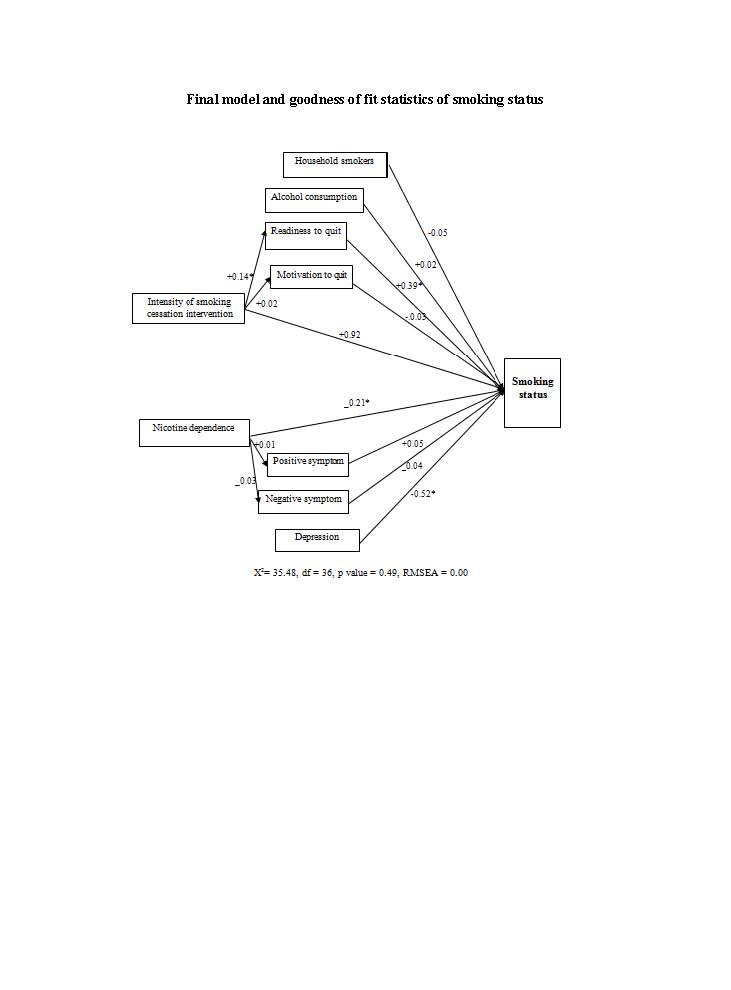Home
Issues
Aims and Scope
Open Access
Editorial Board
Indexing
Why publish with us
Contact us
Instructions to authors (PDF)
Manuscript Types
Manuscript Formatting
How to submit
Preprints
Special Publications & Reprints
Authorship & COI
Principles of Transparency Checklist
Data Policies
Publication Ethics and Publication Malpractice Statement
Predicting factors of smoking status in adult schizophrenia smokers
1
Royal Thai Navy College of Nursing, Thailand
2
Chulalongkorn University, Thailand
Publication date: 2018-03-01
Tob. Induc. Dis. 2018;16(Suppl 1):A910
KEYWORDS
TOPICS
ABSTRACT
Background:
Smoking status defined as self-report of smoking indicated that smokers use the cigarettes per day. Comparison with the general population, schizophrenia smoke more cigarettes per day. Schizophrenia smokers who made quit attempt and reduced the number of cigarette per day were more likely to succeed in quitting smoking. The benefit of identification of factors significantly associated with smoking status may lead to mental health care providers conducting the smoking cessation intervention for this population. This study aiming to examine the direct and indirect relationship of the predicting factors of smoking status in schizophrenia smokers.
Methods:
Multistage random sampling was used in the Department of Mental Health of Thailand. Six tertiary psychiatric hospitals were randomly selected from all regions, and 400 schizophrenic smokers were selected by the purposive sampling technique. All participants completed 12 questionnaires, with reliability ranging from 0.72 to 1.00, and Validity ranging from 0.86 to 1.00. The acquired data was analyzed using descriptive statistics and Path analysis.
Results:
The findings revealed that the hypothesized model fit the empirical data and could explain 48% (R2 = .48) of the variance of smoking status. Moreover, nicotine dependence and depression had a significant negative direct effect on smoking status (ß= -.21, ß= -.52). Readiness to quit had a significant positively direct effect (ß= .39) on smoking status and intensity of smoking cessation intervention had a significant positively indirect effect (ß= .14) on smoking status through readiness to quit.

[Final model and goodness of fit statistics of smok]
Conclusions:
The results demonstrated that the factors influencing smoking status were readiness to quit, nicotine dependence, intensity of smoking cessation intervention, and depression. Identifying these variables can be used to develop appropriate smoking cessation interventions to help smokers with schizophrenia success quitting smoking.
Smoking status defined as self-report of smoking indicated that smokers use the cigarettes per day. Comparison with the general population, schizophrenia smoke more cigarettes per day. Schizophrenia smokers who made quit attempt and reduced the number of cigarette per day were more likely to succeed in quitting smoking. The benefit of identification of factors significantly associated with smoking status may lead to mental health care providers conducting the smoking cessation intervention for this population. This study aiming to examine the direct and indirect relationship of the predicting factors of smoking status in schizophrenia smokers.
Methods:
Multistage random sampling was used in the Department of Mental Health of Thailand. Six tertiary psychiatric hospitals were randomly selected from all regions, and 400 schizophrenic smokers were selected by the purposive sampling technique. All participants completed 12 questionnaires, with reliability ranging from 0.72 to 1.00, and Validity ranging from 0.86 to 1.00. The acquired data was analyzed using descriptive statistics and Path analysis.
Results:
The findings revealed that the hypothesized model fit the empirical data and could explain 48% (R2 = .48) of the variance of smoking status. Moreover, nicotine dependence and depression had a significant negative direct effect on smoking status (ß= -.21, ß= -.52). Readiness to quit had a significant positively direct effect (ß= .39) on smoking status and intensity of smoking cessation intervention had a significant positively indirect effect (ß= .14) on smoking status through readiness to quit.

[Final model and goodness of fit statistics of smok]
Conclusions:
The results demonstrated that the factors influencing smoking status were readiness to quit, nicotine dependence, intensity of smoking cessation intervention, and depression. Identifying these variables can be used to develop appropriate smoking cessation interventions to help smokers with schizophrenia success quitting smoking.
CITATIONS (1):
1.
Tobacco dependence and motivation to quit among patients with schizophrenia in Morocco
Achbani Ahmed, Lahlou Laila, Laaraj Hicham, Ouhamou Mina, Mouhadi Khalid, Salahddine Zineb, Elomary Omar, Elabbani Mohamed, Ramdani Fatima Zahra, Doufik Jalal, Amine Tbatou, Rammouz Ismail
Journal of Public Mental Health
Achbani Ahmed, Lahlou Laila, Laaraj Hicham, Ouhamou Mina, Mouhadi Khalid, Salahddine Zineb, Elomary Omar, Elabbani Mohamed, Ramdani Fatima Zahra, Doufik Jalal, Amine Tbatou, Rammouz Ismail
Journal of Public Mental Health
Share
RELATED ARTICLE
We process personal data collected when visiting the website. The function of obtaining information about users and their behavior is carried out by voluntarily entered information in forms and saving cookies in end devices. Data, including cookies, are used to provide services, improve the user experience and to analyze the traffic in accordance with the Privacy policy. Data are also collected and processed by Google Analytics tool (more).
You can change cookies settings in your browser. Restricted use of cookies in the browser configuration may affect some functionalities of the website.
You can change cookies settings in your browser. Restricted use of cookies in the browser configuration may affect some functionalities of the website.

